#a lot has changed in the queer liberation movement since the 50s you know
Text
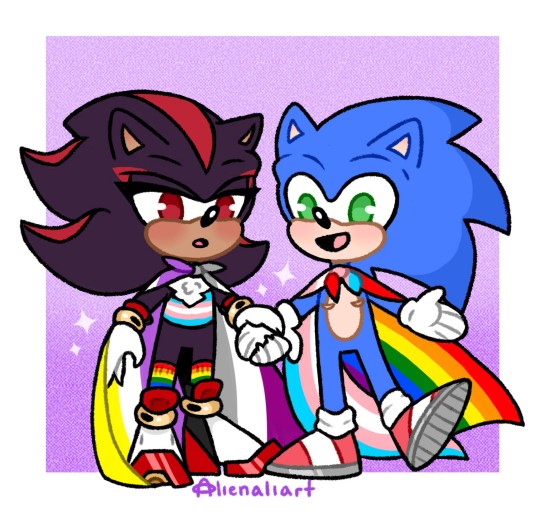
Gentle reminder that your faves are as gay and trans as you want them to be 🏳️⚧️🏳️🌈
#sonadow#shadow the hedgehog#sonic the hedgehog#sonic#sonic fanart#sth#alienaliart#artists on tumblr#shadonic#sonic x shadow#gay and trans boyfriends let's go#I like to think the context for this piece is that it's Sonic taking Shadow to his first pride#a lot has changed in the queer liberation movement since the 50s you know#Shadow is mesmerized ❤️#self indulgent hcs honestly cause I'm an asexual enby and I love seeing myself represented in Shadow#my personal hc for Sonic is that he is an aromantic pansexual cause that's how my partner is#and he's in a queerplatonic relationship with Shadow ❤️#this was my first time drawing them as chibis and I love how adorable they turned out#I just wanna give them so much hugs
155 notes
·
View notes
Text
To Build a Future Without Police and Prisons, We Have to Imagine It First
This short essay was inspiring to read. By dreaming and asking questions about what the world would be like without police, we can participate in our own abolition as people in this imagined new world.
The ideas of a “utopian world” are interesting, as she uses the aspect of science fiction and quotes Octavia E. Butler: “I find utopias ridiculous. We’re not going to have a perfect society until we get a few perfect humans, and that seems unlikely” (56). The imagined utopia is a dreamscape, something beautiful to reach toward. But in this, it is hard to imagine humans as being something other than flawed. What would we look like as perfect beings? How do we achieve this goal?
We wrote a response to the prompt in class, and I loved being able to imagine myself 50 years in the future. Here is what I wrote:
Dear Diary,
Wow, it has been a journey these last couple years. It feels like I was 22 just yesterday, but alas, I am going on 73. There were some days I didn’t think I would make it, but boy am I glad I did. It has been a beautiful and hard journey into the real world as it changed both for the good and bad. It reminds me a lot of a graph, one that goes up and down over short intervals, but over the long run, grows exponentially positive. When I was in college at Colorado State University, I took a Queer Studies class that inspired change within myself, therefore inspiring the work and change I can put into my community. I was inspired by the idea of small changes to make in my life, small impacts that I can imprint upon the world. I found this through the work of DEI as it evolved and changed within our school systems. Since I ended up going into education myself, it was important to be able to change the curriculum and mindsets from the ground up. In my English classes, I taught books that featured POC and Indigenous authors, highlighting the importance of diversity in thought and experience. I never read any of the books that I taught when I was a kid! Out with the old white guys, in with a new batch of folks. It has been incredible that I was encouraged to do so by my bosses and peers. They all shared a similar view in uplifting minority voices, so it was quite easy for me to feel safe and supported in doing so. I was able to see so much change and in such a short time with the youth I was working with. They were so much more accepting of new people and ideas than anyone was when I was their age, which in turn inspired me to continue my work in the classroom. I feel lucky that I was able to turn the page of social justice for so many kids in my own community, passing the torch as it was done for me in my college experience. Although I haven’t kept in touch with any of them, I know they are out there taking what they learned in my class and making their own small changes in their lives. Once the ripple has started, it can truly create waves.
‘Til next time,
A
I urge you, as readers, to imagine yourself in this prompt given, and to take the time to reflect upon the work you are doing now, and want to do in the future. Imagine it's fifty years in the future, and social justice movements have continued winning and advancing liberation. What would your life be like? What would your everyday routine be?
0 notes
Text
TLDR; if there is to be a liberated america, we must first liberate the south, and it must come from within
yesterday, i met a man who reminded me of my grandmother's late-husband: white, southern, more than likely racist. he was trying to sell my brother a vintage desk. while he guided us around the warehouse, we kept up conversation, and he told us about himself: he'd worked in the business for 40 years and was native to the city. been there since the 60s, seen it grow.
the state's been on an upward trek since the civil rights movement, he said, when our democratic governor struck a deal with bobby kennedy to get an IBM plant nearby the capital. things have changed, all right. people want good quality desks and cabinets and such, they see how good the antiques are, but they don't want to pay for it. the state's furniture industry's died out.
i'd gone to another warehouse for a sale a week prior about an hour east of the city. small town, but one of the biggest in that part of the state. the region is part of the Black Belt and probably averages at a 50-50 split of white and Black, though there are towns where you'd be lucky to scrounge up more than a handful of whites. i was guided through the grass lot next to a church to park my car by several Black teens and men, and then i pushed through crowds of white folk to look for discounted lampshades.
I saw a homophobic cartoon this morning. it was two panels: the left depicted a horde of homosexuals waving the rainbow flag, wearing ski masks and holding weapons, saying, "we're not hurting anybody!"; the right had an overall and trucker hat-clad man leaned back on his porch sipping a beer, and behind him hung the confederate flag. "same," he said. i have the suspicion that this cartoonist has neither met a real life gay person nor stepped foot below the 39th parallel.
a few weeks ago, i discussed with my brother the recent "return to tradition" within the folk and country genres. the left wants to take the music back. no more talk of blind patriotism or nationalism – real country music's about class struggle and being anti-establishment. we listened to a song from a prominent face in the movement. it was distasteful. the message was clear: capitalism is evil; but there lacked an understanding of the nature, the art of genre. add to it the put-on accent and the physical styling that was apparent faux-queerness, the over-three-minute song felt like something a middle school drama teacher from seattle might put on because it was "thought provoking" while remaining taboo enough to feel illicit because it kind of sounded like her understanding of country music.
perhaps she's not wrong, though. if you turn on the country radio, you'll hear men who don't actually talk like that and wore boat shoes up until their agent bought them a pair of fashion boots talking about standing for the flag and "god bless america"; talking about living small and being grateful for the little they have.
what little is there to be grateful for? are we to be grateful for the fact that our economy largely remains in 1865? perhaps we are grateful that propaganda over the last 150 years has allowed for the rest of the nation to peaceably ignore the violent struggles of the majority of the nation's Black population because only poor racist white people live here?
"if you don't like it, then leave." leave my home? why should i? this is where i'm from. it's where i live and grew up. why can't i love it and not like it at the same time? if there's to be change, it should come from the people who live here, not the ones who think they know what it's like because they like the way luke bryan sounds.
0 notes
Text
gay rights paper
Gay rights
There is a lot of improvement on the right of lgbtq people, but there should be more change and we should keep progressing to make it so every country the lgbtq community has equal rights as everyone. This paper talks about Stone Wall inn riots, black cat protest, Netherlands compared to the united states on gay rights and Egypt and how it is still bad.
In the united states the most well know protest for gay rights is the Stonewall riots. It is what sparked the gay rights movement in the united states. The Stonewall riots started on June 28, 1969. Like most gay bars in that time the stonewall inn was owned by the mafia. In 1969 be gay was against the law in the united states. The police raided the stonewall inn June 1969 there had been many riots at gay bars at this time the people at the stonewall inn had enough they did not like how they were being treated. The police stared checking ids and taking gender nonconforming people to the bathroom to make sure they had at least 3 pieces of clothing of their sex assigned at birth. If they did not pass this check, they were put in police cars. Marsha P. Johnson and Sylvia Rivera both trans women started the riot by throwing the first bricks and bottles and yelling ant the police. Eventually other people from the bar joined the riot causing the police to barricade themselves in the inn. The patrons of the Stonewall inn had enough of being oppressed and stood up for themselves. This led to days of protest. the Stonewall riots lead to the first pride parade. In a democracy now on June 28 2019 they had a remembering stonewall on 50th anniversary, leaders of the uprising look back on sparking the lgbtq movement.
Years before the stone wall riot was the black cat protest, los Angeles February 11, 1967. What sparked this protest was Jan 1 1967 and how the patrons of the black cat tavern were treated according to Daniel Avery article 10 lgbt uprisings before stone wall Avery said “On New Year's Day 1967, undercover cops raided the Black Cat Tavern in Silver Lake, brandishing guns and beating patrons with clubs and pool cues. A bartender was pulled across the bar, lacerating his face on broken glass. Several drag queens were arrested, as were two men engaging in a New Year's kiss. (The couple was convicted of lewd conduct and had to register as sex offenders.)” This is horrible that people were celebrating the new year and treated this way. That is horrible that two young men got put on the sex offender list just because they kissed. The two men did nothing wrong they were gay and kissed each other and got punished for it they got swept up in the new year. It is sad at this time that being gay was against the law in the united states. Avery also said “Weeks later, 200 protesters picketed for days in front of the tavern, marking the first time LGBT people organized against police harassment. They were met by squadrons of armed officers but continued their peaceful protest.” 200 protesters stood up for those people that were mis treated on January 1 1967. The stood for the men arrested and put on the sex offender list. They stood up for the drag queens and the bartender. Those 200 people stood up for their right and the right of future generations. This protest is not well known about but the fact that it the first time LGBT people organized against police harassment is amazing. These protesters were peace full, but the cops were not. The protesters were not treated kind by the cops. According to Hailey Branson article Fifty years later, Silver Lake tavern stands as a monument to L.A.'s gay rights movement Branson said “On Saturday night, the 50th anniversary of the demonstration, they marched again outside the Black Cat on Sunset Boulevard, carrying picket signs with the same words as those in the black-and-white photos of the original protest. “Silence = Death,” the signs read. “Peace in Silverlake.” “Stop illegal search and seizure.” “Blue fascism must go.”” This shows how important the black Cat protest was. It shows people are trying to remember history and make sure history does not repeat its self. People that did this on the 50th anniversary wanted to make sure the brave 200 people were not forgotten. They wanted to make sure that people relied how far we have come how hard we fought and fight still.
With all these protest in the United states, but the United states is not the best for gay rights Netherlands is the best for gay rights and passed more laws sooner then most places in the world. Netherlands also has more protections then other places. Since May 5, 1945 in Netherlands it is legal to be queer. That is very impressive in the united states it has only been legal since June 26, 2003 to be queer. That is a 59-year gap between the two different countries. With Stonewall in 1969 it still tock the United states tell 2003 to make being queer legal. On the first of April 2001 Netherlands made same sex marriage legal. It was the first country in the world to make it legal. At this time, it was still against the law to be queer in the United states. The United states made same sex marriage legal in June 26, 2015. 14 years after Netherlands. In the Netherlands they made it legal to change your gender on official documents without surgery in December 18, 2013. In the United states it has been legal since 2013 but depending what state you are in you still might need surgery to change your gender. In Netherlands it has been legal for same sex couples to adopt a child since September 12, 2000. In the United states it has varied since April 1986 if same couples can adopt depend on the state and the state’s law. So, this is better but also worse because not all states allow it still. In Netherlands it is illegal to discriminate against the LGBTQ since 1993. This is not that good because they had made being queer legal since 1945. So, it took a lot of time for no discrimination. In the United states discrimination is illegal depending on the individual state laws, since January 2011. Netherlands was the first country to allow gay soldiers to serve openly in the military since 1974. In the United states gay, bi, lesbian can serve openly in the army. Since July 1 2016. Trans people are banned from serving in the army since April 12, 2019 because of president’s Donald Trump law. In Netherlands conversion Therapy is regulated not banned or criminalized. Since fed 14, 2014. In the United states conversion therapy is banned in Washington, Illinois, Washington DC, New Jersey, California, Untitled states minor outlying islands. The other states are not banned but are regulated. It is impressive that some states have it banned but would be more impressive if all the states had it banned.
I talked about good countries now lets look at some bad ones. In Egypt they are not a good place. In article by Handley Stewart “you can’t be out” Gay Egyptians continue to fear persecution. Stewart said “While same-sex sexual relations are not explicitly prohibited in Egyptian law, a 2017 report by the International Lesbian, Gay, Bisexual, Trans and Intersex Association (ILGA) found that “the Law on the Combating of Prostitution, and the law against debauchery have been used liberally to imprison gay men in recent years.” That is not cool that they use the word debauchery to imprison gay men. It is disgusting that Egypt makes queer people hid who they are so they will not get prosecuted and throwing into jail.
As you can see laid out in this paper there has been many good strides to make it so the lgbtq couminty has equal rights, but we should keep improving so people do not need to fear who they are. Also people do not regret who they are.
Reference page
BecarefulNotToLook, and Imullin01. "Equaldex." LGBT Rights in United States. N.p., n.d. Web. 5 Dec. 2019.
Branson-potts, Hailey. "Fifty Years Later, Silver Lake Tavern Stands as a Monument to L.A.'s Gay Rights Movement." Los Angeles Times. Los Angeles Times, 12 Feb. 2017. Web. 10 Dec. 2019.
Danlev. "Equaldex." LGBT Rights in Netherlands. N.p., n.d. Web. 5 Dec. 2019.
Sonoma, Serena, and Roslyn Talusan. "6 Facts You May Not Know About The Stonewall Riots." Wear Your Voice. N.p., 28 June 2017. Web. 5 Dec. 2019.
Stewart, Hadley. "'You Can't Be Out': Gay Egyptians Continue to Fear Persecution." NBCNews.com. NBCUniversal News Group, 21 Aug. 2018. Web. 11 Dec. 2019.
2 notes
·
View notes
Text
Chapter Twenty-Two : LA CAGE AUX FOLLES DOGMA

Dogma : the official system of principles or doctrines of a religion or the positions of a philosopher or philosophical school.
In 1973 at the Théâtre du Palais-Royal, took place the first official performance of La Cage Aux Folles written by Jean Poiret, a vaudeville centering on confusion that ensues when the son of a night club owner and his main star (also a man) brings his female fiancée’s ultraconservative parents for dinner. An incredible success on stage, it went on the run for close to 2,000 performances.
Five years later, La Cage Aux Folles was adapted into a movie directed by Edouard Molinaro. You want to talk about phenomenon ? It became the second-highest grossing movie in France that year, with 5,406,614 admissions and is till the 10th highest grossing french movie in the U.S.
It was later adapted into a Broadway musical in 1983 with Harvey Fierstein at the helm (see article from June 2nd), and a remake was shot in 1996 directed by the great late Mike Nichols called The Birdcage.
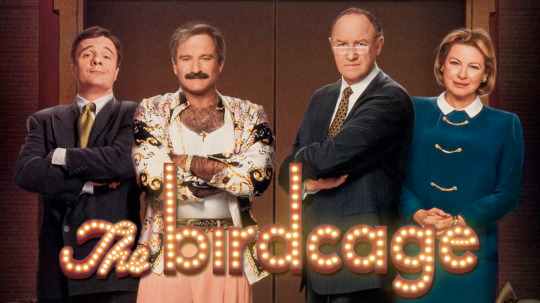
I have to tell you that right now, I hate La Cage Aux Folles. It has little to no qualities in terms of production value and cinematic interest and most of all, it’s probably one of the most offensive movies in the History of cinema for LGBTQ+ people. But it was also a product of its time, enslaved by moral codes and infused by a lack of comprehension that is ours today.
That’s what I want to talk about here. Representation.
It ain’t pretty. Like Michel-Serrault-in-drag-not pretty.
HISTORICALLY VILE
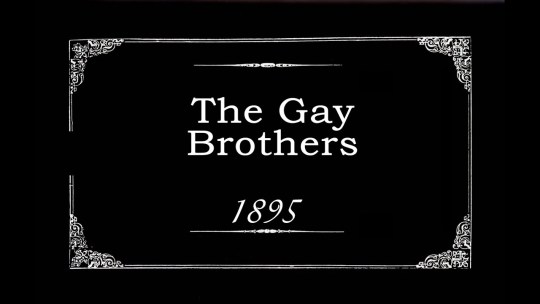
The first representation of homosexuality in cinema was in 1895’s short silent film The Gay Brothers. We can’t really know for sure because
1. homosexuality was not common knowledge back then
2. Gay didn’t mean Fag in the late 19th century
3. two men dance together while a third plays the fiddle. Conclude for yourself.
Anyway, the movie intends to be comical and makes a lot of jokes at the expense of its protagonists. Trend-starter, that one.
As movie making was booming, increase awareness and presence of Queer people appeared in that media. Unfortunately, the rise of the Production Code (created in 1922) brought a lot of censorship to the community in its possibility of portrayal.
Homosexuality was never explicitly mentioned and only in two ways : as a comical device or a villainous character who’s sickness, perversion and crimes are obvious to the audience.
When it came to homosexuals, worldwide viewers had three options to explore : laughter, pity or fear.
Early on, the girlish traits of the gay character and the stupidity of its desires were put front and center, whether in westerns (The Soilers) or in Charlie Chaplin movies (Behind the Screen). In historical movie term, the character would be referenced as the SISSY. Answering to the same principles as the whore, the dad or the saint figures, the SISSY had for purpose to give more masculine value to the hero (and to the viewer). But as the butt of the joke and in the constraints of the Production Code, he didn’t have a proper sexuality to act. An innocent childish fool.
This convention continued with the talkies in the 20s and 30s as a subject that was partially shown but never discussed.
The few non-judgmental attempts at depicting Queerness were met with furious reactions and indescribable indignation from religious audiences, like when Marlene Dietrich kissed a woman on the lips in Morocco (1930), causing reinforcement of the Code.

For over two decades, scripts would pass through intense censorship and oppression, erasing homosexual overtones in novel adaptions or changing too direct gay references and replacing them with anti-semantic plot lines, more line with the time.
To override the code, directors had to be extremely smart. Alfred Hitchcock, a master of all movie crafts, was the best at this game. In 1948’s Rope, two roommates kill another man to finally know what it feels like, then host a dinner party in their apartment while the body is still there. The movie is fascinating in its “one-shot” concept and the script never mentions the possibility of a sexual relationship between the two but if attentive, you realize that they live in a one-bedroom apartment. Since you’ve spent the entirety of the movie in the living room, you know no one sleeps here. So. They gay. They’re also despicable murderers. Yep. FEAR factor.
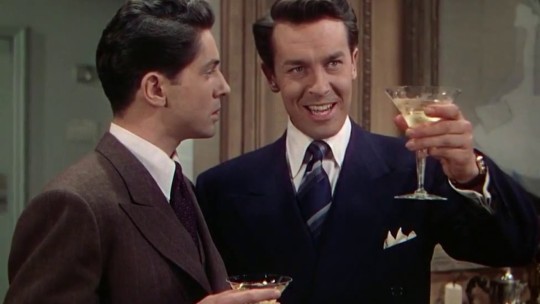
I have so many more examples of this but let’s fast forward to the late 50s and the end of the Production Code’s dominance on Hollywood. 1959’s Some Like it Hot depicts two male protagonists pretending to be women who join a musical touring band. Straight people dressed in woman’s clothes. Come on, moviegoers, time to LAUGH. That movie gets a pass because Billy Wilder is a genius.
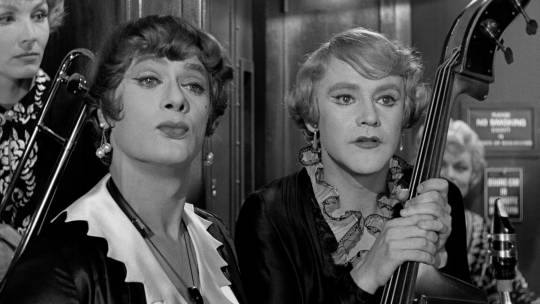
Then you have Spartacus (1960) and that homo-erotic relationship between the protagonist and its servant. Still underlined as hell but still.
Then not much else. Until…
WE GOT FUCKED (AND NOT IN A GOOD WAY)
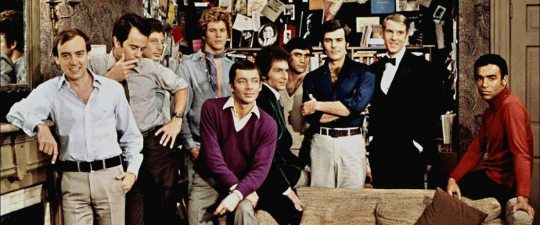
In the States, The Boys in the Band (1970) shook things for good (and, in a lesser way, The Producers, 1968). A year after the Stonewall Riots, while homosexuality was still considered a mental illness, This play adaptation’s portraying of nine homosexuals (eight, if you’re really delusional) was revolutionary. But some of their characterizations (I’m looking at you, Emory) and the way they tear each other apart as sure-to-be closeted monsters are quite hard to watch. In a way, they are still crazy sissies. Audience, PITY those homosexual fools.
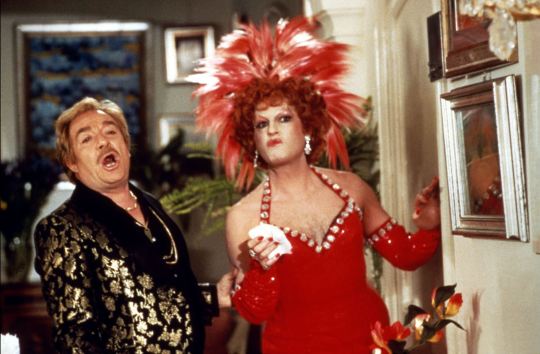
And then, La Cage aux Folles. Although France made some attempts at talking about homosexuality without obeying to the social et moral duties of the era with La Nouvelle Vague (Amitiés Particulières, 1964), it was Molinaro’s popular success that sealed audiences’ views on gay people in this brand new era.
By depicting Zaza (Michel Serrault) in such a flamboyant way, combining homosexuality, drag queens, transvestites and transgender people into one, this movie, with its truly international success, wrote unintentionally a new rulebook about what a homosexual is deemed acceptable on screen. Such rule would be followed for decades to come. Do you now understand the dogma definition at the beginning of the article? I’m a smart cookie, you know.
LA CAGE AUX FOLLES DOGMA
For a gay character to be portrayed in a major motion picture and thus be accepted by audiences, he has to :
1. Be recognizable from the straight characters, as not to confuse the audience.
2. Be funny and over the top, so that the audience don’t take offense to its immorality.
3. Reassure male audiences on their true masculinity with ridiculous ways to act, walk, talk and live.
4. If your movie embraces the gay character’s view at some point, be sure to let him make all the compromises in the world so that the audience knows that HE knows that what he is doing is ‘peculiar’ and ‘wrong’
5. Make fun OF him as much as possible. And pretend you’re having fun WITH him.
PS. Don’t forget, glitter and fun mockery.
Zaza screams his lungs out for nothing and everything. Sorry, “her” lungs out, since SHE only uses the female pronoun to talk about HERself. She performs in a gay cabaret, is clearly depicted as the female counterpart of the relationship (because you need to apply binary concepts no matter what), decides to dress as a woman to meet the conservative in-laws for the first time. Zaza is the new post-gay liberation movement acceptable SISSY.
Zaza is also a plague for the movement.
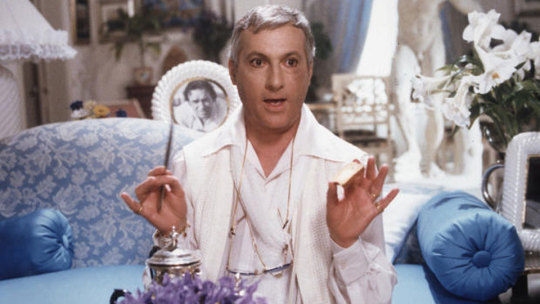
Michel Serrault, as talented of an actor as he was, doomed us for years to come by transposing a fantastic stage character into a movie ready to be assimilated by millions.
Media is power. If they say something has to be this or that, the audience will follow, especially in a time when gay people weren’t equals in rights or ready to mingle with the general population.
Critics embraced it. It was nominated for three Oscars. Serrault won Best Actor at the Césars. The Golden Globes deemed it the Best Foreign Film of that year. Talk about Media approval.
We were fucked.
THE MINORITY AFTERTHOUGHT
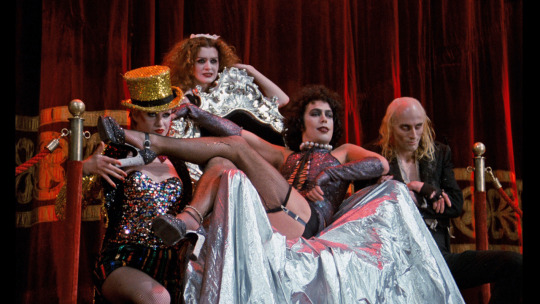
The greatest decade in cinema (in my opinion) saw the portrayal of a couple of… interesting gay characters. The Last Picture Show (1971), Cabaret (1972) and its flamboyant Maître des Lieux.
Dog Day Afternoon (1975) shocked audiences with a protagonist in a relationship with another man. Unfortunately, that other man is a SISSY who wants to have Reassignment Surgery in no way portrayed in a positive light.
The Rocky Horror Picture Show (1975) gave a shitload of screen time to Queer characters, but (SPOILER ALERT) he is an alien from another planet, a freak and the movie became a cult classic with time, it was not a studio film.
In television, gay people are nowhere to be found. Homosexuality is barely getting talked about in the news.
The Mary Tyler Moore Show has Mary go on a date with a man who turns out to be gay. It’s funny. So wacky.
Not much else.
I found a couple of shows from the 80s with LGBT plot lines .(Thirtysomething! Thirtysomething!) but the article was already way too long. Make your own damn research !
NOT THAT KIND OF SISSY

To my recollection, the first time a homosexual person was portrayed in a truly positive light was in Jonathan Demme’s Philadelphia. The struggle of a HIV-positive man seeking justice after he was fired. Tom Hanks won his first Oscar. Bruce Springsteen also won for his incredible song “Streets of Philadelphia”. I mean, it was still about pity lots of ways but the humanity in which the character is shown is outstanding. As Hanks puts it “Love is spelled with the same four letters”.

The 90s saw a biggest variety of Queer characters portrayed in american cinema. The Crying Game. Philadelphia. Jeffrey. Showgirls. My Best Friend’s Wedding. To Wong Foo, Thanks for Everything! Julie Newmar. Most of them offensive in terms of clichés (because… written by cis straight folks ? YEP). but a welcome demonstration of our colors.
Australian classic The Adventures of Priscilla, Queen of the Desert (1994) stays a example on how to do proper representation without removing the potential ridiculousness of Queer existence.
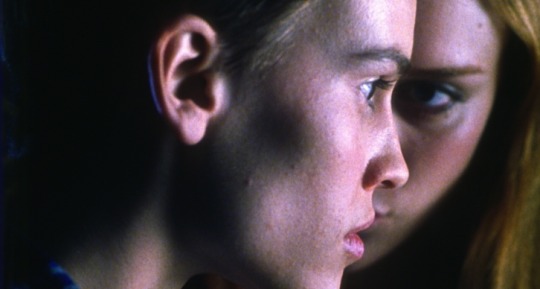
At the dawn of the new millennium, independent cinema offered us Boys Don’t Cry (1999), the true story of Brandon Teena, a trans man who tried to live his authentic life and got killed for it. More than putting Hilary Swank on the map (and an Oscar is her hands), it was unique in the sense that the queer protagonist wasn’t a joke, wasn’t scary and did not inspire pity. He was a strong man, a tuff spirit and a model for trans generations to follow.
UNAPOLOGETICALLY QUEER
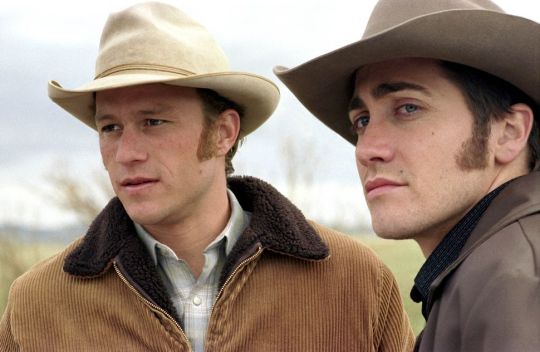
Boys Don’t Cry was followed by a series of incredible movies and characters not afraid to be as Queer, as proud and as strong as Brandon Teena.
Before Night Falls (2000), Hedwig and the Angry Inch (2001), The Hours(2002), Mysterious Skin (2004), Breakfast on Pluto (2005), Kiss Kiss Bang Bang (2005), Transamerica (2005), Brokeback Mountain (2005), Kaboom(2010), Blue is the Warmest Color (2013), Dallas Buyers Club (2013), Pride (2014), The Imitation Game (2014), The Way He Looks (2014), Carol (2014), Tangerine (2015), Moonlight (2016), Call Me By Your Name(2017), A Fantastic Woman (2017), Disobedience (2017), Battle of the Sexes (2017), The Miseducation of Cameron Post (2018), Love, Simon(2018), Rocketman (2019).
Even when the gay character is used as a tool for jokes, modern cinema proved that it can be done without making fun of the gay life style, as in Scott Pilgrim vs The World (2010).

They are still mistakes along the way.
Bohemian Rhapsody. Oh fucking Bohemian Rhapsody. That movie is an abomination. First (and most importantly here), its depiction of Mercury’s sexuality is of poor-taste, even less when it comes to talk about his HIV/AIDS diagnosis. Then, it was directed by a serial rapist. Finally, it’s just a awful movie which uses nostalgia as a way to convince you that you are watching something great. And IT WON 4 ACADEMY AWARDS !
FUCK. MY. LIFE.
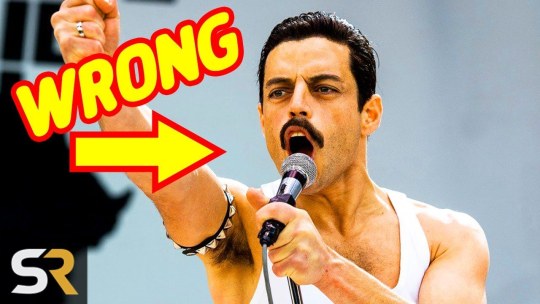
(To all my homies who know me, off course I was going to talk about Bohemian Rhapsody at some point. I’ll take that motherfucking cinematic slap in the face to the grave).
DAWN OF A NEW GAY ?
The question is simple : has visual media abandoned the dogma of La Cage Aux Folles ?
Harder answer. Yes and No.
NO, because if movies like Isn’t It Romantic (2019) in which a gay character is (even purposely) can be the protagonist’s cliché best friend still exist, it means that movies are still no over that phase of its education.
Also, if someone you barely know still ask you basic offensive questions about your sexuality, it means that we’re definitely still basically fucked. Remember, media is power.
And YES, in a way, this abominable dogma is long gone thanks to TV.
I know, right ? Cinema’s little bastard brother which didn’t want to talk about homosexuality in the 70s AND 80s ?
One of the first shows to depict homosexuality on a regular basis was HBO’s Oz. Thank you, cable. In between stabbings, sex violence and vicious murders, there was a serious exploration of the male sexuality.
Then came the 1998–1999 broadcast television season and its one-two punch. It followed Ellen’s Puppy episode (which we covered in the June 8th article).
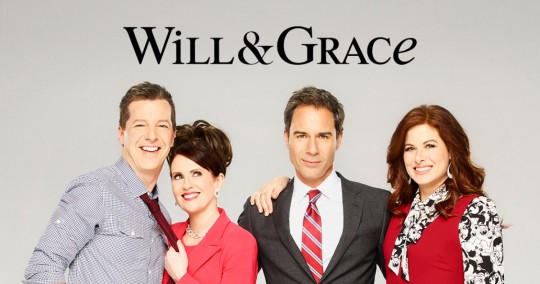
On September 21st, 1998, Will & Grace premiered its first episode. And yes, today, we view it as a very narrow view on homosexuality. But think about it in the context of 1998. It’s a show with two of its leads unapologetically openly gay males (and a ageless woman ready to go either way). Each episode of the show was about homosexuality, and some jewish themes thanks to Grace, television’s number one fag hag. And shit, this show was funny until season 6. Like, real funny. Even the lost-in-time reboot has some redeeming qualities.
Finally, on February 17, 1999, the character of Jack introduced at the beginning of the second season of Dawson’s Creek, came out as gay. Don’t underestimate the power of teens. If they’re in on it, we all are. They were woke before “woke” was a thing.
That was just the beginning.

Queer as Folk (UK and US) and The L Word became pioneers of the LGBT TV revolution.
The Office’s Oscar Martinez came out in the season three premiere (2006), to limited clichés on its part.
Ugly Betty (2006–2010) was the gayest show of the 2010s.
By 2009, Glee ignored the window other shows created and busted the door wild open with at least 8 regular Queer characters. That same year, Modern Family introduced us to a very stable gay couple.
2011 saw the rise and consecration (in my mind) of Max Blum on Happy Endings, the ultimate cliché-avoider of the Queer community — so not a cliché that I identify more with his flaws as a man than as a gay man.
2012’s The New Normal failed at gaining the attention it deserved. Partners (2012) failed as well, but it kind of deserved it.
Brooklyn Nine Nine did something no one else did before : talk about bisexuality without making a big deal about it.
Buffy The Vampire Slayer, Once and Again, Six Feet Under, The Wire, Angels in America, Desperate Housewives, Battlestar Galactica, Grey’s Anatomy, Brothers & Sisters, Skins, Greek, True Blood, The Good Wife, United States of Tara, Shameless, American Horror Story, Please Like Me, Game of Thrones, Girls, Smash, Broad City, Orange is the New Black, Grace and Frankie, The Fosters, Superstore, Unbreakable Kimmy Schmidt, Orphan Black, Crazy Ex-Girlfriend, Transparent, Looking, The Real O’Neals, Friends From College, Sense8, One Day at a Time, This is Us, The OA, Champions, Dear White People, The Handmaid’s Tale, Pose, The Good Fight, Killing Eve, American Crime Story, The Haunting of Hill House, Now Apocalypse, Gentleman Jack, Years and Years.

They all, in small or big ways, contributed to what the situation is today.
Something closer to reality, debunked of clichés.
It’s a golden age to be Queer on TV.
I’ll say it a third and final time. MEDIA IS POWER.
A couple of years ago, I screened my end-of-study movie called Faggot (and Other Semantics) to my schoolmates and a few faculty members. The movie was about a gay dude trying to figure out who he was as a gay man (not a coming out but a coming in story) — it was very well received. At the end of the day, the tech guy who put the movie on signaled me to come and see him.
I did. He shook my hand and said ‘I didn’t know I could identify with a gay man but I did”. We’re talking about a straight single kinda annoying thirty year-old man. I wanted to slap him in the face. I kept thinking about what he told me thought.
I get it now. A window opened (even for a second) in his mind because a piece of Art took the time to represent someone “different” while using universal tropes. And without making fun of the situation.
It was an unwanted validation that I now fully accept.
That’s why La Cage Aux Folles is wrong and its dogma can fuck off.
Queer people have a voice now in the industry and are able to represent.
Queer people, REPRESENT.

0 notes
Text
Post Election 2016
Post Election 2016 – What Do We Do Now?
A sermon by Meredith Guest
Delivered at the Unitarian Universalist Congregation of Petaluma on December 11, 2016
Luke 6:27-36
If the recent election of Donald Trump was anything, it was a slap in the face to every progressive, liberal minded American. And make no mistake, it was an intentional slap in the face; that was a great part of the man’s appeal to those who voted for him. And so we, like the cast of “Hamilton,” the diverse Americas who are alarmed and anxious that [this] new administration will not protect the hard-won rights of the last 50 years have been intentionally slapped upside the head with a 2x4 branded with the name of Trump. With our ears still ringing, our eyes still smarting, our values run down like so much road kill, what do we do now?
In the passage from Luke I just read, Jesus says, if someone slaps you upside the head, you are to willingly offer up the other side for equal treatment. But like so much of the Bible – most of it, actually – this isn’t to be taken literally. What he means is: you are to be the one where the violence stops; that’s why you turn the other cheek. What I have to decide now is: Will I be the person who chooses to let the violence stop with me? And what you have to decide is: Will you be the one who willingly and freely chooses to have the violence stop with you.
It goes without saying, this is not our default setting. When slapped upside the head, we are programmed to fight or flight, and unless you plan to leave the country, there’s really nowhere to run; this guy is president. But I must remind you that fight or flight is also the default setting of a gerbil, and if being human means anything, surely it means we are not limited to the default setting of gerbils. It’s one thing to hold to the principles of Unitarian Universalism when YOUR guy holds the reins of power, but what about when evil is at the gate? What do we do then?
1. For one, start looking for ways to make peace.
Mark Lilla in the NYT writes: “But the fixation on diversity in our schools and in the press has produced a generation of liberals and progressives narcissistically unaware of conditions outside their self-defined groups, and indifferent to the task of reaching out to Americans in every walk of life.” (Mark Lilla, NYT, 11/18/16) The only remaining slur acceptable in polite company is “redneck;” and if children are not present, it is often accompanied by an expletive.
The poet Adrienne Rich has said, “When someone with the authority of a teacher describes the world and you are not in it, there is a moment of psychic disequilibrium, as if you looked into a mirror and saw nothing.” This quote used to apply to me and to others in the LGBT community. But not anymore. Now our faces are everywhere you look, while the faces of working class Americans, those faces that used to be THE face of America, are disappearing, rendering them anonymous and their lives invisible.
I once had a child in my class with severe cerebral palsy. She was my student in 4th, 5th and 6th grades. Her name was Johanna and she was a wonderful student. One summer just before the beginning of school, Johanna’s mother recommended I meet with an occupational therapist that they had been seeing. I agreed, and in our meeting he asked me to describe the classroom and Johanna’s place in it. After I did so, he looked at me and said, “This child’s not a member of your classroom. She’s little more than a fixture. No meaningful interaction happens between her and the other members of the class…” This was a “take no prisoners” kind of guy, but I took his words to heart and came up with a plan. I cleared it with the mother and soon after school began, the class did a group challenge. Privately I gave Johanna information that the class had to get from her without the assistance of her aid or any other adult. Only when they got this information would they be allowed to go to recess. It wasn’t easy, but they got the information, went to recess and after we did a few similar things, pretty soon I saw students interacting with her in ways they never had before.
It seems to me we, as a nation, have a similar group challenge. While the well educated, well connected and well endowed have enjoyed the fruits of the modern economy, Donald Trump has sounded a take-no-prisoners wake-up call for those with ears to hear and eyes to see that a whole group of others have been left behind. While technically part of the country, they are like the handicapped kid in the wheelchair who nobody ever talks to and everybody tries to ignore. But in this case, a lot more than recess is at stake.
One of my sources for this talk is the book Deer Hunting With Jesus by Joe Bageant. I’ve also drawn from interviews with J.D. Vance as well as his book Hillbilly Elegy. I have read both, and I highly recommend Deer Hunting with Jesus. Bageant grew up in a small town in Virginia. After high school he went off to college, became a successful journalist and lived for many years in New York City. When talking to his many liberal friends, he would often be asked why rural southerners so often voted in ways that were contrary to their self interests. Finally, toward the end of his career, he moved back to his hometown and set about trying to answer that question. Deer Hunting With Jesus is the result.
When Bageant interviews his old classmates, one of the things he discovers is that none of them knows a liberal. Their own thoughts, their own views and opinions are constantly being reflected back to them and little or nothing to the contrary has a chance to get through. Their lives and the milieu in which they live are insular.
But that’s not just true of conservatives.
During the election I saw a FB post in which a person demanded, “Anyone voting for Trump, please unfriend me.” Pretty soon, we’ll all be living inside intellectual and ideological gated communities where the only people we talk to and hear from are those who think like us.
One of the best things about being a financial failure as an author is that economic necessity forced me out into the world. Had I been successful, I would have sequestered my big old queer self in my cozy little study and spent my days happily writing lies. As it is, I have to work, and so, at least 3 days a week, I substitute teach in schools all over Petaluma from grades 3-12. As a result, hundreds of children get to rub shoulders with a real, live, breathing transsexual who, unlike the ones they see in the media, is not rich, famous or sexy. And whenever I can, I make it a point to interact with the kids in their Mossy Oak camo sweatshirts, because I am likely to be the only transsexual person they ever get a chance to be around, and I want them to know I think they matter, and that I care about them. They don’t always warm up to me. They certainly don’t all like me. They can be cruel. But this is what I can do. I can reach across the divide and offer myself in friendship.
And so can you, but to do that we’ll all have to:
- Stop having a litmus test for who is and who is not worthy of conversation. We need to be talking with racists. In the Nov. 26 issue of the NYT, there is an op/ed piece entitled “Why I Left White Nationalism” by Derek Black. Mr. Black grew up in a white nationalist family — David Duke was his godfather, and his father started Stormfront, the first major white nationalist website — and he was once considered the bright future of the movement. What changed him is – and I will let him speak for himself – “ I began attending a liberal college where my presence prompted huge controversy. Through many talks with devoted and diverse people there — people who chose to invite me into their dorms and conversations rather than ostracize me — I began to realize the damage I had done. Ever since, I have been trying to make up for it.
- We need to stop policing speech like English teachers police grammar. It just shuts people down.
- We are going to have to engage in forbidden conversations, e.g. immigration, abortion, gun rights, religion. And when we engage in these conversations, we must do unto others as we would have them do unto us; which is to say: listen, be curious, be open to their side of the issue, and be prepared to alter or change our own views, and look for any and all common ground. There IS common ground there, but we’ll never find it if we don’t talk to one another.
2. We need to be more critical of our own thinking and aware of our biases.
Under the best of circumstances, even for well educated people, it is hard to be aware of and critical of our own presuppositions and the presuppositions of our group.
I remember on day saying to a little boy in my class, When you meet the right girl… and later, I thought to myself, how do you know he’s not gay? It’s so hard to see those heteronormative presuppositions, but once I did, whenever I had cause to say something similar, I would say, When you meet that special person…It was easy to fix, once I recognized the unconscious presupposition.
Being an educator, I’m especially aware of the presuppositions and prejudices that guide so much of our thinking about school.
The poet, thinker and social prophet, Wendell Berry has said, “A powerful superstition of modern life is that people and conditions are improved inevitably by education.” (W. Berry, What Are People For, pg. 24) (I know a high school principle who puts a quote by Oscar Wilde at the end of her emails: You can never be overdressed or overeducated.) He then goes on to tell the story of Nate Shaw, the pseudonym for a black farmer born in Alabama in 1885. When he finishes paying a moving and eloquent tribute to this remarkable man, he asks: So do you think Nate Shaw would have inevitably been improved by education? Clearly the answer is no. And there are all sorts of successful people, some of whom have made tremendous contributions, who have not been well educated. Would they have inevitably been improved by education? That’s not a given. In fact, as Berry points out, if life on the planet is destroyed, it will almost certainly be by the college educated.
One unfortunate, even dangerous, consequence of this superstition about education is it has led to the denigration of physical labor and the people who do it.
When I went from being a school bus driver to being a substitute teacher, I realized just how differently people see those two occupations and the people who do them. Never mind that, as a bus driver, I made more money and had more authority over the children in my charge, my movement from a blue collar worker to a white collar worker was initially viewed with considerable suspicion by many “white collar” teachers.
I recently saw one of those inspirational posters hanging on the wall of a middle school classroom. It began: “I can be…” then went on to list a slew of possible occupations that were colorfully inscribed on a black background in the shape of a light bulb, symbolizing, I assume, that these were occupations of the enlightened or occupations that would bring enlightenment – or, probably, both. Here’s a quick rundown of some of the occupations listed: software developer, doctor, meteorologist, airplane pilot, anthropologist, microbiologist, epidemiologist, astronaut, cartographer, network analyst, medical scientist, computer programmer, veterinarian, zoologist, geographer, archeologist, architect, conservation scientist and so on down to chemist. I found it ironic that nowhere on this classroom inspirational poster did I find the occupation of – teacher.
Our life on this planet depends on 6 inches of topsoil and the occupation most directly involved with the stewardship of this vital resource, farming, is not, and will likely never be, on the list of things we want our students to aspire to. But the truth is, we could lose every occupation on that poster, and we’d still survive, but without 6 inches of topsoil and the knowledge of how to farm it, we’re just so many skeletons littering the face of the planet.
We need to recognize that no matter how enlightened we imagine ourselves to be, we are not immune to unexamined presuppositions, biases, prejudices and even superstitions just like those damn conservatives.
3. “We must be able to imagine ourselves as peacemakers,” the great poet and prophet Wendell Berry writes. “The serious question is whether you're going to become a warrior community and…I think the only antidote to that is imagination. You have to develop your imagination to the point that permits sympathy to happen. You have to be able to imagine lives that are not yours or the lives of your loved ones or the lives of your neighbors. You have to have at least enough imagination to understand that if you want the benefits of compassion, you must be compassionate. If you want forgiveness you must be forgiving.
It's a difficult business, being human.” (Wendell Berry, Sojourners magazine July 2004)
Contrary to what the pundits say; contrary to the vote talley, there are not 2 Americas; there is only one America, and we are all its citizens. We need to eschew the narrative of us vs them. It is only us; it’s only we.
There’s a beautiful story of what that looks like, but – trigger warning – I’m going to have to read from the Bible again.
Luke 19:41 - Jesus weeps over Jerusalem.
So Jesus climbs to a high place where he can look down on the city of Jerusalem, who’s name in the ancient tongue is “city of peace.” Say what you will about the man, but he was not an idiot. He knew the fate that awaited him there; knew that, short of a miracle, the residents of that city, many who had flocked to hear him in the early days, would turn on him like a pack of hyenas; knew that the leaders would finally succeed in what they had been trying to do for years: kill him. He looks down on the city where he knows he will be murdered; and he weeps for it. Now maybe he wept for himself as well; for his followers who he loved and who he knew would be so heartbroken and bereft without him; maybe he wept for the failure of his vision, his hope, his dream for a different kind of Kingdom. Surely, if only in our imaginations, we can allow him that. But Luke shows him weeping for the city itself: “My people, my people…”
If we are going to rise above the default setting of gerbils and be the people where the violence stops, this, it seems to me, must become our prayer: “My people, my people…” Not just “our people,” not “those people,” certainly not “you people” – My people. It is in this prayer, it is in this position, this stance, that we become the peace for which we pray. “My people, my people…”
But that’s not the end of the story, because the next thing that happens, the very next thing…well, let me read it:
Luke 19:45 - Jesus cleanses the temple.
This passage requires a bit of exegesis to understand fully. Contrary to what the text would seem to indicate, it is likely that Jesus was not upset with the money changers themselves. The exchange of coinage was essential to the operation of the Temple. When Jesus overturns the tables of the money changers, he is, in effect, shutting down the normal operation of the Temple. Why? Because beginning with Herod and continuing after his death in 6 BCE, the temple was, in addition to its legitimate cultic function, the center of local collaboration with Rome. The temple, which was to be the house of worship of the God of liberation, of justice and mercy had come to be run by officials, installed by Rome, who colluded with the Empire for their own profit. The Empire, in turn, followed the economic rules of the domination system, which, briefly, was rule of the many by the few, economic exploitation, with religious legitimation. In other words, the Temple then like the church now, especially, as we saw in the election, the evangelical church, has become the handmaiden of the Empire, pronouncing divine sanction on the status quo. This is the temple Jesus shuts down. And he’s not exactly peaceful about it either.
You know those airline miles you’ve been accumulating? You might want to save them. I just gave a bunch ours to Lia so she can attend the Million Woman March in DC on Jan. 21. “I need to do it for my daughter,” she said. You know your bucket list, you might need to dump it out and replace it with direct acts of resistance. You know that vacation you were planning? You might need to be prepared to sacrifice it for something bigger.
And then, you know what happens next according to Luke? Jesus is found teaching.
Look, I know you’re not biblical people, but you’ve got to admit, this is not a bad program: grief, direct action, teaching. But I cannot emphasize enough: it all depends on our willingness and our ability to pray the prayer: “My people, my people…” And I hope you will hold that prayer in your hearts and your minds as we sing our closing hymn: “We’ll Build A Land.”
AMEN
0 notes